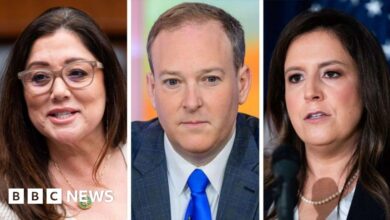When Jimmy Carter Spoke At a Wireless Tradeshow – Slashdot

Former U.S. President Jimmy Carter has died. Born in 1924, he had just celebrated his 100th birthday on October 1st.
If you want to catch a glimpse of his political charisma, YouTube has a clip of Carter’s appearance on “What’s My Line” when he was still only governor of Georgia. Within five years he’d be president of the United States, serving from 1977 to 1981.
But it seems like today everyone has a story to tell. More than two decades later, long-time Slashdot reader destinyland saw Jimmy Carter speak in Las Vegas in 2001 on the final day of the CTIA Wireless tradeshow. “I feel thrilled to be a part of this,” 77-year-old Carter had said….
Carter applauded the work of “entrepreneurs and scientists and engineers that are transforming the face of the globe.” And he noted their technologies could address problems targeted by the Carter Center.
Interrupted by a few cellphone rings, the former President conversed on a stage at the Sands Expo and Venetian Hotel with Tom Wheeler, the president of the wireless communications trade association. Wheeler reminded the audience of Carter’s decidedly nontechnical background, discussing An Hour Before Daylight, Carter’s memoir about growing up on a farm in Georgia during the Great Depression. “We were the only family blessed with an outhouse,” Carter told the crowd.
Wheeler also asked a question many in the technology community could relate to. Carter, he pointed out, had been involuntarily retired. “What’s it feel like?” The former President told the audience he’d re-focussed his energies into humanitarian efforts through the Carter Center, which is active in providing health services around the world as well as monitoring elections. Carter donated his appearance fee to the Carter Center…
Midway through the hour-long discussion, the former President touted his administration’s record of deregulating several industries, including transporation, energy, and communications, saying “If it hadn’t been for that deregulation, this environment in which you all live wouldn’t have been possible.” Carter also shared with the business crowd that it was a belief in free enterprise that made him want to enter politics, drawn from his experiences selling peanuts as a young boy for a dollar a day.
The audience greeted the former president warmly, giving him a standing ovation both when he took the stage and when he left. Carter joked it was almost enough to make him want to get back into politics.
Everyone has their own opinion. When a friend of mine was in high school, she got to meet Jimmy Carter early in his presidency. He’d seemed unusually kind and good, she said, but remembered her first reaction. “They’re going to eat you alive.” And yet then, pointing to the humanitarian work he would continue for four decades, she said he was also clearly America’s very best ex-president.
And the liberal blog Talking Points Memo argues Carter’s accomplishments as president are being re-evaluated:
Some found him to be distinctly unsung, with little attention given to his brokering of peace with the Camp David Accords and emphasis on global human rights. And some just liked him. A serious, intelligent, faithful, deeply honest man who spurned political expediency and burned through hundreds of pages of memos a day, he preached self-restraint, stewardship and commonality to an electorate that cast him off four years later for the glib excesses of Ronald Reagan…. “People assume that because he wasn’t warm and cuddly with Congress that he didn’t get much through,” said John Alter [who wrote the first independent Carter biography in 2020]. “He signed more legislation in four years than Clinton or Obama did in eight. He has the most prodigious legislative record since World War II, with the exception of Lyndon Johnson.”
That record includes, by Alter’s count, 14 major pieces of environmental legislation. In one of Carter’s more creative moves, he dusted off the 1906 Antiquities Act to keep pristine 56 million acres of Alaskan wilderness. His piecemeal approach, cloaked in distinctly unsexy bills like the 1978 Public Utilities Regulatory Policies Act, planted the seeds for a changing national energy system in the face of climate change. Carter had started underlining passages in scientific journals about what is now the most existential crisis of our time as early as 1971. What’s most wrenching about Carter’s improvements in energy and environmental policy now is what he wasn’t able to accomplish. On his way out of office, he issued a report that included recommendations for cutting carbon emissions — at exactly the same rate the Paris Climate Accords coalesced behind 35 years later….
His Carter Center has virtually eradicated certain devastating diseases on the African continent, part of the work for which he received the Nobel Peace Prize in 2002. He and Rosalynn have also helped build and repair over 4,000 homes for Habitat for Humanity, work that continued well into his 90s.
I’ve got my own story. As a young boy I saw Jimmy Carter give a speech in 1977 — just six months after he’d assumed the presidency. A crowd of teenagers thrilled to see the president gave him a long, loud round of applause. And when it finally died down, Carter said…
“I wish I got that kind of reception from Congress.”




